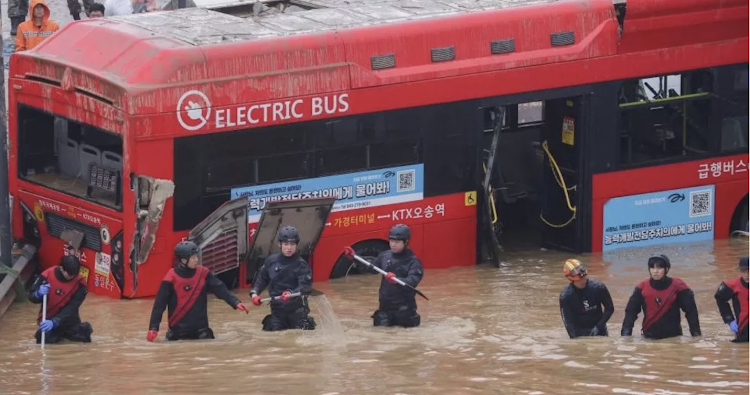At least seven fatalities have been found by South Korean rescuers trying to reach automobiles stranded in a flooded tunnel.
In many parts of the country, torrential rains have resulted in flooding, landslides, and power outages.
There are still ten people missing and at least 26 other deaths are confirmed to have occurred.
It is unclear how many people are still trapped in the tunnel – which is 685 metres long – but 15 vehicles are thought to be submerged.
Officials said the tunnel in Osong – near the city of Cheongju in the central North Chungcheong province – was swamped by a flash flood, which happened too quickly for drivers and passengers to escape after a nearby river burst its banks.
On Sunday morning, six bodies were recovered from inside a bus. That followed the discovery of one other body and the rescue of nine survivors on Saturday.
Local media reported that the latest deaths brought the overall toll from the floods to at least 33.
Most of the other fatalities have been in the mountainous North Gyeongsang region, where landslides have swept away whole houses.
Almost 300mm (11.8in) of rain is reported to have fallen across South Korea on Saturday.
The country typically sees 1,000mm (39.4in) to 1,800mm (70.9in) a year, according to the Korean Meteorological Association – although much of that does fall during the summer months.
Aerial pictures from flood-affected areas show brown mud and flood waters so deep, only the tops of roofs can been seen sticking out.
Thousands of people have been affected by evacuation orders issued by various local governments and Prime Minister Han Duck-soo has asked the military to help with the rescue efforts.
Early on Saturday morning local time, some 6,400 residents were evacuated after the Goesan Dam, also in North Chungcheong, began to overflow, the agency said.
A number of low-lying villages near the dam as well as many of the roads connecting them were submerged, leaving some residents trapped in their homes.
Late on Friday, a landslide caused a train to derail in North Chungcheong. One engineer was injured, but the train was not carrying passengers at the time.
Korail, the country’s national rail operator, has announced the suspension of all slow trains and some bullet trains, and said other bullet services would be disrupted.
The South Korea Meteorological Administration forecast more rainfall through to Wednesday next week. It warned that the weather conditions pose a “grave” danger.
Extreme rain has caused floods and landslides across several countries – including India, China and Japan – over the past fortnight.
While many factors contribute to flooding, scientists say a warming atmosphere caused by climate change makes extreme rainfall more likely.
The warmer it becomes, the more moisture the atmosphere can hold, resulting in more droplets and heavier rainfall, sometimes in a shorter space of time and over a smaller area.
ALSO READ
- Ukraine claims killing thousands of Russian troops
- Comparison Between Ukraine and Russia’s militaries

WANT TO HIRE WEBSITE DESIGNER CONTACT US @Kalda-Tech Systems , See a sample of our work









